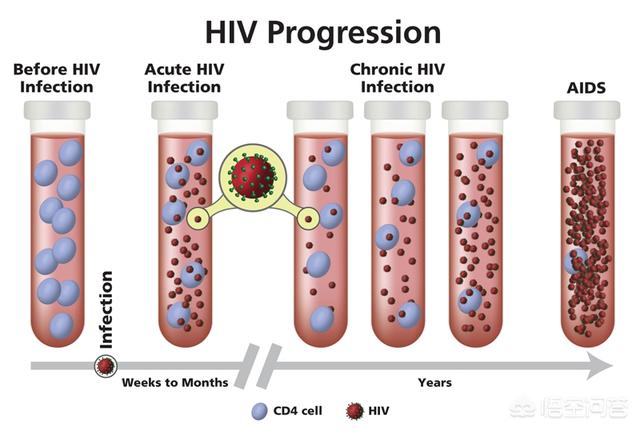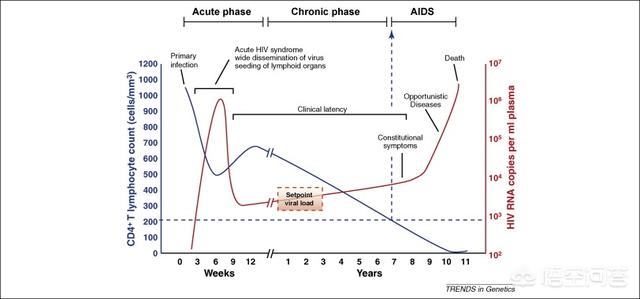What are the 3 stages of HIV development?
Your question is actually for two scenarios
The first situation is in the case of HIV infection without antiretroviral treatment, generally divided into the acute infection period (window period), that is, the occurrence of high-risk sex or drug use has just been infected with HIV, this time some people will have mild diarrhea, low fever and other symptoms similar to a cold, but most of them are asymptomatic, during this period (2-3 weeks) is undetectable antibodies, that is to say, by means of test strips and other means can not detect whether the person is infected with HIV, six weeks later the test results basically determine whether the person is infected with AIDS. During this period (2-3 weeks), no antibodies can be detected, which means that test strips and other means cannot detect whether the person is infected with HIV, and the test results after six weeks basically determine whether the person is infected. The viral load will be very high during the acute stage of infection, and will gradually decrease over time, leading to the latent stage.
The incubation period is as long as 2-10 years, which is related to the individual's physical condition, the subtype of the infected virus, and whether there are multiple cross-infections. Most of our HIV-infected patients, especially gay men, are infected with the AE subtype, which develops in an average of four years and progresses relatively faster than other subtypes.
At the onset of the disease, that is, when the HIV virus has completely broken down the human immune system, the body's immune cells-CD4 is already very low (about 600-1200 in normal people), and some people with the disease are even in the single digits, and a variety of symptoms such as enlarged lymph nodes, weight loss, skin rashes, pneumonia and so on, often appear at this time. However, even at the onset of the disease, if there is still a chance of antiretroviral treatment, there is still a high chance of surviving the disease.
The second situation is that it is detected in time and antiretroviral treatment is carried out. Of course, there is also an acute infection period, but in the incubation period of the infected person by taking antiretroviral drugs at regular intervals every day, HIV generally in six months after taking the drug down to undetectable levels that is, TND, then through the human body's immune reconstruction, CD4 back to normal levels, the infected person is able to live to a normal human life expectancy. At present, the state provides free drugs are relatively more side effects, but the patent of HIV antiviral drugs are almost all in the hands of American drug companies, the state pays a huge amount of money every year to provide drugs for infected people is already very difficult. Nowadays, drugs are becoming more and more advanced and less resistant, and those who are in a position to do so can take advanced drugs at their own expense. It is expected that in ten years' time, infected people will be able to use long-acting injections, that is, one injection every 1-2 months, and will no longer need to take drugs every day.
In short, uninfected people should be careful, have high-risk sex to timely testing, once found infected to timely antiviral treatment, according to big data projections, 30 years AIDS will be attacked (Ma Yun said), so the dawn is just around the corner, you cherish the body.
Hand-typed by myself, never copy other people's things, and there is no false matching pictures, I hope to help you, feel useful, click a like is to encourage us creators in the field of health, thank you!
When a person is infected with HIV HIV and does not receive treatment, they usually go through the three stages of AIDS onset. However, if an HIV-infected person receives HIV medication的curing, or antiretroviral therapy (ART), slows or stops the progression of HIV onset from one stage to the next.

HIV Acute Infection Stage(Acute HIV Infection)
Within two to four weeks of contracting HIV, infected patients may experience flu-like symptoms such as fever, headache and rash that may last for several weeks. This is the body's natural response to HIV infection. When a person is in acuteHIVDuring the infected stage, they have a large amount of HIV in their bloodstream, which is highly contagious. However, people with acute infections often don't realize they have HIV because they may not feel sick right away or at all. To know if someone has an acute HIV infection, a fourth-generation HIV or nucleic acid test is needed.
Clinical latency (Chronic HIV Infection)
This period is sometimes referred to as the period of asymptomatic HIV infection or chronic HIV infection. During this phase, HIV is still active, but reproduction levels are very low. During this time, the infected person may not have any symptoms or sick conditions. For people who do not take medication to treat their HIV infection, this phase may last 10 years or more, but some people may go faster. For people who receive antiretroviral therapy (ART) every day, this phase may last for decades.
At this stage, it is still possible to transmit HIV to others, but on antiretroviral treatmentviralPeople who are suppressed are much less likely to transmit HIV than those who do not receive treatment. At the end of this phase, the viral load begins to rise and the CD4 cell count begins to fall. When this happens, you may begin to experience symptoms as viral levels increase in your body and enter phase three.

AIDS Stage (AIDS)
AIDS AIDS is the final and most severe stage of HIV infection. As HIV severely damages the body's immune system, the body is unable to fight off opportunistic infections (opportunistic infections are infections of diseases that occur more frequently or more severely in people with weakened immune systems), causing them to develop more and more serious illnesses. People with HIV are diagnosed with AIDS if their CD4 count falls below 200. Without treatment, people with AIDS usually only survive for about 3 years. Common symptoms of AIDS include chills, fever, sweating, swollen lymph glands, weakness and weight loss. People in the AIDS stage have a high viral load and are highly contagious.
Three stages of AIDS:1, the main manifestations of Kaposi's sarcoma (KS):This disease is a multifocal tumor nodule, 1/3 of AIDS patients have this disease. Often occurring in the hands, feet, calves, and then centripetal expansion of the exhibition, the lesion of the skin is red or greenish-purple patches, papules, nodules or plaques, the size of the (sorghum rice to lentil size), diffuse infiltration hemorrhagic, morphology, the number of more (up to hundreds of), the texture of the various (can be spongy, but also solid, a few wart-like flower-like), the main symptom is not obvious (can be burning, pain, itchy), about About ten percent of patients have liver, spleen, kidney, brain and other internal organs damage, a few people only have anemia and liver and spleen lymph node swelling and pain, fever, emaciation and no skin lesions. 2, the main manifestations of Pneumocystis carinii pneumonia (pcP): may be acute or subacute onset, mainly with respiratory distress and pulmonary infiltrates. In HIDs patients, the incidence is as high as more than 50 percent.3, other "opportunistic infections": there can be meningeal, intestinal, ocular choroidal, vulvar, perianal and other infections, viruses, fungi, bacteria can be infectious agents.
A person progresses from HIV infection to AIDS in the following stages.
1. Window period. Refers to the stage from HIV infection to the body can detect HIV antibodies, subject to individual differences and different testing methods, the window period is generally 2 weeks - 6 months, for example, nucleic acid test can detect HIV in the blood in 2 weeks; and the common enzyme immunoassay to be a little bit longer, the general recommendation is 3 months. It is now generally accepted that the window period for HIV infection is 2-8 weeks. At this stage the infected person is basically without any clinical symptoms.
2. Acute infection period. At this stage, the number of HIV in the infected person's body reaches its peak, and many infected people will have some clinical symptoms, such as low fever, flu-like symptoms, chronic diarrhea and skin rash, etc., which usually do not cause special attention, but doctors will ask about recent behavioral experiences, so as to make a judgment as to whether it is necessary to do HIV screening.
3. The latent period, also known as the asymptomatic period. At this stage, HIV-infected patients do not have any symptoms and are no different from normal people. At this stage, the CD4 T lymphocytes in the infected person's body will be subject to a large number of destruction, if they do not control their own behavior, the number of CD4 T lymphocytes will drop very quickly in a short period of time, and the incubation period will be short accordingly; if they can control their own behavior at this stage, follow the doctor's advice, take the medication on time, and monitor the toxic side effects and drug resistance, the incubation period will also be long accordingly. Currently, the incubation period of HIV is considered to be 0-30 years, with an average of 8-10 years.
4. AIDS stage, only to this stage of HIV infection is called AIDS. Patients in this stage will have many opportunistic infections and clinical symptoms, such as tuberculosis, enlarged lymph nodes (especially in the neck, armpits and groin), generalized skin rashes, thrush (fungal infections in the mouth), Pneumocystis carinii pneumonia, Kaposi's sarcoma and other kinds of tumors. This phase lasts about six months to two years, but some patients last longer.
In short, AIDS is currently in the stage of preventable and untreatable, in our country now on the treatment of AIDS to implement the absolute confidentiality of the test, the discovery of treatment, localized management, free treatment. It is still recommended that you clean yourself up, avoid high-risk behaviors of HIV infection, and don't discriminate against those around you who are infected with HIV! If you are already infected, don't give up, follow your doctor's advice and take treatment seriously! In addition to taking your medication every day on time, you will also have a piece of heaven and earth that belongs to you, just like normal people!
Window period Latent period Onset Window period Newly infected, no virus detected Latent period Virus enters the body Immune system is still healthy No symptoms in the body Onset period Immune system is destroyed Gets a variety of diseases that people don't normally get
Acute infection stage, asymptomatic infection stage, AIDS stage, alas, it's really going to be bad luck when you run into it. Let's be optimistic and enjoy the last life.
This question and answer are from the site users, does not represent the position of the site, such as infringement, please contact the administrator to delete.